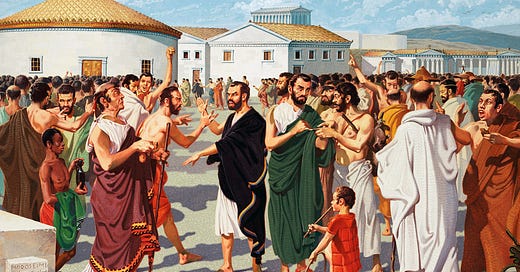Dear Classical KIDS,
Today’s ancient Greek word of the week is perfect for people! Really!
It is an idea that was born long ago in archaic Greece, but continues in many English words today. With a rich and multifaceted history, deeply embedded in Greek culture, politics, and social organization, it is important to know ancient Greek word "δῆμος" (dēmos).
Meaning "people" or "population," the word "δῆμος" is thought to derive from the root *dā-, which means "to divide" or "to distribute." This root shows us the idea of a community or a group of people divided from others.
During the early days of ancient Athens, demos referred to a suburb or subdivision of the city... but later it grew to include citizens of Athens (as opposed to slaves or non-citizens) and later to the common people or the citizenry of a community, in contrast to the elite or ruling classes.
This evolution is so important because it explains the words we know today, the ones that come from Demos.
For instance, do you know what a Democracy is? It is from Greek "δημοκρατία" (dēmokratía), combining "δῆμος" (dēmos) meaning "people" and "κράτος" (krátos) meaning "power" or "rule." Democracy refers to a type of government where the power is with the people, either directly or through representatives that they elect.
We also use Demographics ("δημογραφία" (dēmographía), combining "δῆμος" (dēmos) with "γραφή" (graphē) meaning "writing" or "description") to understand populations, especially human populations.
But not all “Demos” derived words are good!
A Demagogue ( "δημαγωγός" (dēmagōgós), combining "δῆμος" (dēmos) with "ἀγαγός" (agāgós) meaning "leader" or "guide") is considered a bad leader. It’s a person who seeks to gain power by appealing to the emotions, fears, and prejudices of the populace rather than using rational argument...
And an Epidemic is certainly something to be avoided! It comes from "ἐπιδημία" (epidēmía), combining "ἐπί" (epí) meaning "upon" and "δῆμος" (dēmos) and means a virus or disease is affecting a large number of people.
These terms all reflect the influence of the Greek concept of "people" in various aspects of social and political life... both back then and today. It’s a powerful term for the people.
Discussion:
Why do you think “Demos” became “Democracy”? What connects the words?
Have you heard of Democracy? Can you think of countries that are democracies today?
Why would we want to understand populations? Who uses “demographics”?
What would Socrates think about a Demagogue?
Write it out!
Download the traceable “demos” and practice saying it here:






This article gives a misrepresentation of the culture and times in which it evolved. In Ancient Greece, women were not considered "citizens" (or at least not "full citizens" in Athens) and were not included in the "demos," who were land-owning, free men. The status of women was little more than as property; they were considered part of the household and were responsible for child-rearing. The word may have evolved to include "everyone," but in truth even today some "demos" are more privileged than others.
The education of children is important. They need to know where they come from, what ideologies underlie what they are taught and what we have learned from history in order to be prepared for the world in which they live.
https://www.nationalgeographic.com/history/history-magazine/article/revealing-the-hidden-lives-of-ancient-greek-women
https://en.wikipedia.org/wiki/Women_in_Greece
https://www.worldhistory.org/article/927/women-in-ancient-greece/